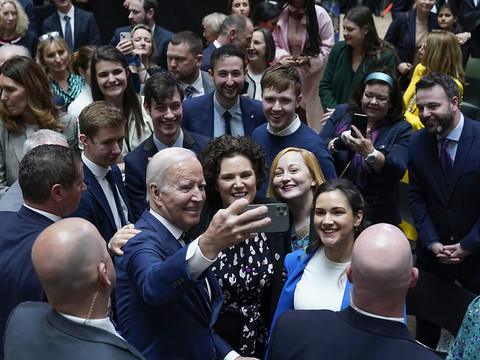Joe Biden, who came as a ‘friend’ to Northern Ireland, called on local political forces on Wednesday to overcome their divisions to end the paralysis of institutions. These are at a standstill, 25 years after the signing of the peace agreements.
Before joining Dublin for a very symbolic visit in the footsteps of his ancestors, the American president, who claims his Irish origins, made a quick stop in Belfast to celebrate the peace agreements signed on April 10, 1998 after three decades of ‘Troubles ‘ between Unionists loyal to London, mostly Protestants, and Republicans, mostly Catholics, in favor of joining the Republic of Ireland.
But the commemoration comes up against a much more difficult political reality. The local institutions created 25 years ago, within which the two long-enemies communities share power, are indeed blocked due to the consequences of Brexit.
A lesson’
During a speech at the University of Belfats, Joe Biden recalled that three decades ago, a building such as that of the university, all of glass and steel, would have been unthinkable, in a city of Belfast criss-crossed by barbed wire, shaken by explosions and deadly clashes – 3,500 dead in total for the whole period known as the ‘Troubles.’
‘The lesson of the ‘Good Friday’ agreements is that it’s when things seem most fragile… there’s the greatest need for hope and effort,’ he said , touting the economic potential of Northern Ireland, a struggling province in which Washington promises to invest.
‘I hope that the (local) assembly and government will soon be restored,’ he said while being careful to stress that the final decision rested with local political leaders.
Political paralysis
Joe Biden had previously met the leaders of the five main political parties in Northern Ireland – including the DUP, a unionist party which does not hide its mistrust of this Catholic president and so proud of his Irish roots.
For more than a year, the DUP has refused to participate in Northern Irish institutions because of the special status inherited from Brexit. The Unionists, mainly Protestant, remain inflexible despite the recent conclusion of an agreement between Brussels and London on the question, delicate among all, of the physical border with Northern Ireland.
Joe Biden once again expressed his support for this agreement, the “Windsor framework” on Wednesday: “I think the stability and visibility that this framework offers will encourage investment” in Northern Ireland.
Without going so far as to call the US president ‘anti-British’ as a member of his party, DUP leader Jeffrey Donaldson politely dismissed him, saying he was still waiting for further legal changes. strengthening Northern Ireland’s place within the United Kingdom.
Family Pilgrimage
Joe Biden also briefly saw British Prime Minister Rishi Sunak, who said the bilateral relationship was “very good”.
This, even if Joe Biden’s quick visit to the United Kingdom, and the very brief interview with the head of the British government, may have given London the impression that the American president was providing a minimum service. Especially in contrast to his two-and-a-half-day visit to neighboring Ireland, which is mostly akin to a pilgrimage by the 80-year-old Democrat in the footsteps of his ancestors.
After landing in the rain in Dublin, he will stay in the country of his ancestors, which he often repeats carries ‘in his soul’, until Friday evening. He will make an institutional stopover in Dublin on Thursday, then another personal visit on Friday to the county of Mayo, to the west.
As of Wednesday, Joe Biden must go to County Louth, another family cradle. He will have the opportunity to contemplate, from the top of a castle, the port from where one of his ancestors left for America in the 19th century, fleeing like many Irish people from a country ravaged by famine.
In Dublin, he will walk in the footsteps of John F. Kennedy, who addressed the Irish parliament in these terms in 1963: ‘It is this character trait of the Irish, this remarkable alliance of hope, confidence and imagination, which we need now more than ever.’
This article is originally published on rtn.ch


